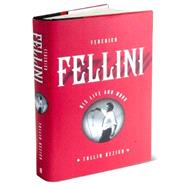
Tullio Kezich is the film critic for Corriere della Sera. He has written numerous books on cinema as well as other subjects, and is a widely performed playwright.
| Introduction: September 1952, on the Terrace of the Hotel des Bains | xi | ||||
|
3 | (14) | |||
|
17 | (4) | |||
|
21 | (6) | |||
|
27 | (10) | |||
|
37 | (8) | |||
|
45 | (6) | |||
|
51 | (3) | |||
|
54 | (13) | |||
|
67 | (5) | |||
| 10. Wartime Wedding | 72 | (5) | |||
| 11. Discovering Italy | 77 | (18) | |||
| 12. Writing Is Easier When There Are Two of You | 95 | (9) | |||
| 13. A Moveable Feast | 104 | (10) | |||
| 14. Stardust | 114 | (4) | |||
|
|||||
|
|||||
| 15. It All Happened in Five Minutes | 118 | (11) | |||
|
|||||
|
|||||
| 16. Farewell, Youth | 129 | (10) | |||
|
|||||
|
|||||
| 17. A Little Bit Kafka | |||||
|
139 | (4) | |||
| 18. Reality Is a Fairy Tale | |||||
|
143 | (15) | |||
| 19. Lea, "Ia Paciocca," and the Others | 158 | (8) | |||
| 20. Martyr for the Con | 166 | (8) | |||
|
|||||
|
|||||
| 21. A Kindly Soul of the Streets | 174 | (15) | |||
|
|||||
|
|||||
| 22. A Journey with Anita | |||||
|
189 | (5) | |||
| 23. The Summer of via Veneto | |||||
|
194 | (13) | |||
| 24. Public Sinner | 207 | (7) | |||
| 25. The Big Bishop of Federiz | 214 | (7) | |||
| 26. The Dream Man | 221 | (7) | |||
| 27. The Moralist | |||||
|
228 | (5) | |||
| 28. The Conscience of Guido | |||||
|
233 | (18) | |||
| 29. The Woman in the Shadows | |||||
|
251 | (14) | |||
| 30. La Dolce Morte | 265 | (16) | |||
| 31. Edgar Allan F. | |||||
|
281 | (5) | |||
| 32. Journey into the Unknown Fellini Satyricon | 286 | (9) | |||
| 33. The Ambassadors of a Vocation | 295 | (8) | |||
|
|||||
|
|||||
| 34. A Second Native Land | |||||
|
303 | (6) | |||
| 35. Distant Memories | |||||
|
309 | (8) | |||
| 36. A Dispassionate Seducer | 317 | (13) | |||
|
|||||
|
|||||
| 37. The Violent Years | 330 | (8) | |||
|
|||||
|
|||||
| 38. The Bacchanalia | 338 | (8) | |||
|
|||||
|
|||||
| 39. Ship of Fools | 346 | (13) | |||
|
|||||
|
|||||
| 40. School for Shamans | 359 | (6) | |||
| 41. And Here's to You | |||||
|
365 | (8) | |||
| 42. Everyone Is Japanese | |||||
|
373 | (7) | |||
| 43. The Nostalgia of Silence | 380 | (9) | |||
|
|||||
|
|||||
| 44. The Autumn of the Patriarch | |||||
|
389 | (5) | |||
| 45. The Start of a Great Future | 394 | (5) | |||
| Time Line | 399 | (18) | |||
| Acknowledgments | 417 | (2) | |||
| Index | 419 |
The New copy of this book will include any supplemental materials advertised. Please check the title of the book to determine if it should include any access cards, study guides, lab manuals, CDs, etc.
The Used, Rental and eBook copies of this book are not guaranteed to include any supplemental materials. Typically, only the book itself is included. This is true even if the title states it includes any access cards, study guides, lab manuals, CDs, etc.
Excerpted from Federico Fellini: His Life and Work by Tullio Kezich
All rights reserved by the original copyright owners. Excerpts are provided for display purposes only and may not be reproduced, reprinted or distributed without the written permission of the publisher.